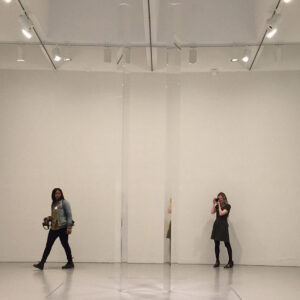I was watching, once again, the music video by Oneohtrix Point Never the other day. It is the video where the woman in the scary mask skates across the pond of thin ice with a scythe held behind her back. You know, that one. The one where the kid in the (fake) Eighties sit-com somehow has a current-day cell phone and fights with his parents about whether he can keep it or not. It’s the video that re-mixes all manner of things from Eighties culture and music and puts it all back together with a kind of uncanny, hovering sadness that is all but impossible to put one’s finger on, exactly, and which is, indubitably, the whole point of the look and feel and style of the music and the video, the song itself being called, completely unsurprisingly, “Lost But Never Alone,” which manages rather distinctly to describe a “whole mood” as the kids might put it.
I was watching Oneohtrix Point Never in the related project of trying to figure out just what the heck exactly it is about The Weeknd, who released his most recent album, Dawn FM, a couple of weeks ago, and I have never quite been able to understand why I am both attracted to and repelled by everything that is The Weeknd. I say repelled because there is a kind of loosely held emptiness, a brazen cynicism and pure Pop indifference to the music of The Weeknd that often makes me feel frustrated both with The Weeknd (why do you have to be so glib?!?!) and then in some related way with myself and then also with nearly everything. But then when I listen to The Weeknd for a little longer I realize that he is also frustrated with himself, and by extension with me and also very much with more or less everything. His music is the music of that. And then somehow it is also at the same time the utmost in listenable and cherry-flavored fun-all-the-way-down meaningless Pop. Meaningful meaninglessness. Adrift on an ocean of which you cannot even fathom the contours. Pretending to have fun and then somehow also actually managing to have fun in the process of pretending. But also not.
I was both surprised and then again not really at all surprised to find out that Oneohtrix Point Never and The Weeknd have been working together for some time now and to find out also that Oneohtrix Point Never was involved in the production of The Weeknd’s Super Bowl halftime show last year, which was a classic The Weeknd spectacle in that it was truly and completely the product of a great and legendary Pop deity who can only now be compared, as The Weeknd himself is so very aware, with figures like Michael Jackson, Madonna, Prince, etc., and at the same time the spectacle was very much in the vein of a deconstruction of all spectacle, and a playing out of the exhaustion and collapse of Pop stardom and of all the things that make fame and notoriety and then pushing deeper into the unraveling, even of all the things that make a person a person, the collapse and winding down of existence itself, you might say, or at least the form of existence that we currently seem to find ourselves stuck within, stuck within a twenty-first century that goes nowhere and cycles around in its own more and more distant memories in a tightening spiral that seems, nevertheless, infinite. But also enjoyable, somehow? Somehow strangely pleasing and pleased in the slow dissolution.
I was even further unsurprised, though also properly delighted, to find out that Oneohtrix Point Never and thus, by extension, the Weeknd himself, that both of these artists have direct ties to the Vapor Wave movement of a decade or so ago and to realize that Dawn FM might best be described as a musical statement of Vapor Wave come many years too late, which is utterly perfect, of course, utterly pleasing in that the greatest statement of Vapor Wave would come a decade after it had already died, this being so utterly pleasing for the simple reason that Vapor Wave itself is about dying and not-dying, about being already dead and also living on and on amidst the vapors of a past that maybe did have some reality, some concreteness, that contained at the very least something like fragments of the Real, though Vapor Wave also seems conscious of the possibility that even this is an illusion, that even the Eighties, the decade that haunts the memories and dreams of the early twenty-first century and the ever-devolving cultural forms of the early twenty-first century, that even these dreams and ghosts of a time, the Eighties, that might still have had some fragments of reality and of sincerity to hold onto, that even this might be a reverse projection of a false-nostalgia that also collapses when it is interrogated with any honesty and so Vapor Wave, like the Derridean-inspired Hauntology that is its intellectual co-pilot, so this Vapor Wave is truly the saddest and most lost of all cultural movements because the only thing it has to hold onto, the only thing that gives it ground, are the bits and pieces, the cultural flotsam and jetsam, the scraps of commercials jingles and fragments of New Wave music and characters from sit-coms that somehow made it through the cultural trash compactors of the last few decades and that are themselves scattered on the vast ocean of detritus that one sorts through without direction or purpose in the post-dystopian landscape of planet earth 2022.
And then there is Gasoline, the song from Dawn FM that contains the following verse amidst its dreamy-groovy space-beats and vaguely EDM pulsing:
It’s 5 AM, I’m high again
And you can see that I’m in pain
I’ve fallen into emptiness
I want you ’cause we’re both insane
I’m staring into the abyss
I’m looking at myself again
I’m dozing off to R.E.M.
I’m trying not to lose my faith
Morgan Meis has a PhD in Philosophy and is a founding member of Flux Factory, an arts collective in New York. He has written for n+1, The Believer, Harper’s Magazine, The Virginia Quarterly Review and is a contributor at The New Yorker. He won the Whiting Award for non-fiction in 2013. Morgan is also an editor at 3 Quarks Daily, and a winner of a Creative Capital | Warhol Foundation Arts Writers grant. A book of Morgan’s selected essays can be found here. His new book from Slant is The Drunken Silenus. He can be reached at morganmeis@gmail.com.





